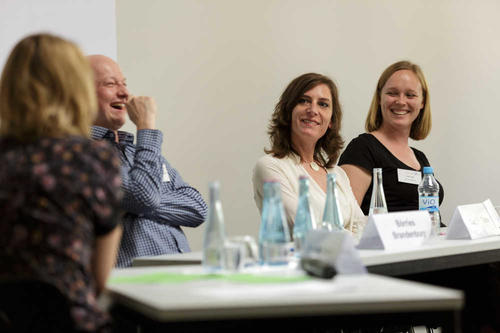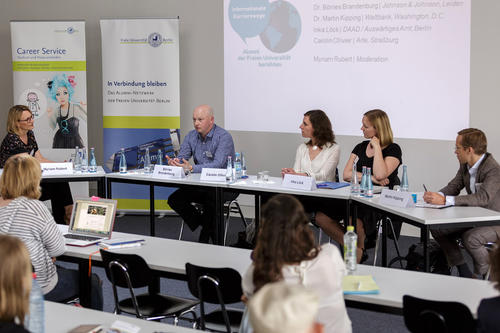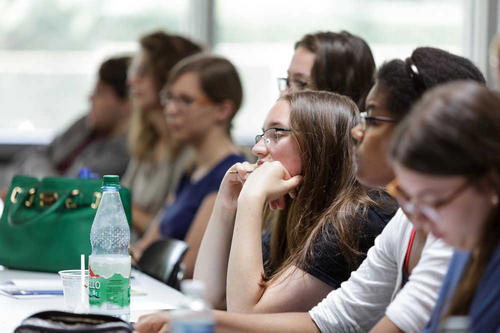International Careers, Made at Freie Universität Berlin
Where will my career go once I graduate? How will I manage to go abroad?
Sep 26, 2016
The alumni confirmed that looking back, having the courage to break with the old or to take an indirect path always yielded key experiences for their careers and their lives in general.
Image Credit: Michael Fahrig
Börries Brandenburg, Carolin Ollivier, Inka Löck, and Martin Kipping (from left to right).
Following the event, participants had a chance to engage in personal conversation, continuing the discussion of the many questions the event itself had not answered.
Image Credit: Michael Fahrig
Four German graduates of Freie Universität who are now working in another country or in the field of international relations talked about how they started their careers and about detours, strategies, coincidences, hurdles, and successes along the way. The occasion was an event for students and doctoral candidates held as part of International Week and hosted by the Alumni Network and the Career Service of Freie Universität, which helps students get their bearings and chart a course with regard to their future careers.
“I wish there had been an event like this in my day,” says Börries Brandenburg, who studied at Freie Universität, earning a doctorate in 2005, and now develops vaccines for Johnson & Johnson in the Netherlands. Brandenburg recalls the academic challenges and worries for the future that attended his studies all too well. The first oral presentation he had to give in English during his program in biology made a lasting impression. Working with a German textbook and then giving a presentation in English at a conference in the United States was a major step in his international career.
Alumni as Sought-after Advisors
Since Brandenburg’s time at Freie Universität, the university has steadily expanded the range of academic and career advising services it offers, all with the aim of providing all students, including doctoral candidates, with the best possible support as they actively shape their academic and professional careers. Graduates like Brandenburg are important advisors during this process, offering authentic reports on their experiences as students and in professional practice.
A Roundabout Path instead of a Direct One
“I’m interested in hearing how the alumni got where they are today,” one participant said. Many audience members had expected to hear about a seamless curriculum vitae with no gaps and impressive positions, but they were surprised by the responses from the alumni. Frustration, bad decisions, and gaps in a person’s résumé are normal, they all agreed. “If I could tell you just one thing, it would be that there is always more than one option. You don’t have to take the first thing that comes along,” advised Carolin Ollivier, who works in Strasbourg, France, as the editor in chief for ARTE Journal, a program broadcast by the Franco-German TV channel ARTE. She also cautioned that people should take courage and bring about change themselves, especially when dissatisfaction becomes their baseline mood. The other alumni confirmed that looking back, having the courage to break with the old or to take an indirect path always yielded key experiences for their careers and their lives in general.
Passion is Key
The alumni also made it clear how important it is to have a firm and accurate sense of oneself and one’s own goals when choosing a career – sometimes even including standing up to the prevailing opinion. After all, no matter how attractive a job title or salary may be, if a person does not have a passion for the job, he or she will not do well, either professionally or personally. Brandenburg commented, “When I think about how many hours I work – if it were just about the money, I wouldn’t do it. I’d rather look for something that I really put my heart and soul into.” A lack of passion, he said, would become obvious by the time he started making his next career move, since just saying “I am motivated” is not enough to convince HR managers. By contrast, those who can point to concrete examples showing that they have demonstrated professional passion in the past and are willing to work hard for something and acquire new skills have significantly better chances during the application process, he said.
Applying and Networking – What are the Right Approaches?
In their professional positions, all of the alumni who participated in the event either have personnel responsibility or are involved in the hiring process. The students took the opportunity to ask a number of questions about what is important to decision makers. As with their own careers, the alumni agreed that there were two factors they do not consider at all when selecting staff: a straightforward CV, and existing relationships, or who a candidate knows. Instead, they focus on professional aptitude for the position and on recognizable life and work experience, the ability to learn, and the drive to get things done.
An application package should show the applicant’s personality, said Inka Löck, who works as a team leader for the German Academic Exchange Service (DAAD) after stints working in Copenhagen, Istanbul, and Kabul and is now a Desk Officer at the Directorate-General for Culture and Communication of the German Federal Foreign Office. Unusual hobbies, longer periods spent abroad – even when unrelated to a person’s studies – and professional dead ends should not be hidden in a person’s CV, she said, since they yield an overall picture that gives the employer a better understanding of who the applicant is. In addition, Löck pointed out, applicants should not feel like supplicants during an interview, but should instead consider that the interviewer is also looking for a suitable candidate.
Even with internships, the idea isn’t just to add as many positions as possible to a person’s résumé, Ollivier said. She advised attendees to think of internships more as an opportunity to find out what interests them and forge personal ties. “Gaining an impression and making an impression” was the idea, she said. People should feel free to ask themselves, time and again, whether they would benefit from something.
And what about networking, which is so often touted? It’s not necessarily the key factor for those who are just embarking on a career, explained Martin Kipping, who works as an advisor at the German office of the World Bank in Washington, D.C. People should not view their contacts primarily from the perspective of how they could be useful, but above all as valuable additions to their personal lives. Alongside vertical networking, Löck pointed out, it is essential not to forget the importance of horizontal networks, which offer opportunities to share information and experiences with colleagues. She said that many people do not fully appreciate how much value this adds in terms of their own advancement.
Thinking Outside the Box
Anyone who is considering studying abroad or wants to work in an international environment in Germany can set the stage early on. Acquiring language skills and seeking out opportunities to spend time abroad during a study program can point the way forward in this regard. However, professional experience in another country, for example through internships, is even more important, since working abroad requires more extensive engagement with the country, its language, and the workplace culture, Ollivier pointed out. She added that those who take the time to go abroad during their studies, try out various things, and seize opportunities also have a head start in terms of determining what professional objectives or places of residence enter into consideration later on.
Full Speed Ahead
Following the event, participants had a chance to engage in personal conversation, continuing the discussion of the many questions the event itself had not answered. Franca Brand, head of the Alumni Office at Freie Universität Berlin, summed up: “The lively interest in the event and the many specific questions the students asked confirmed once again just how much demand there is among students and doctoral candidates to hear about the experiences of graduates. The alumni team will bear this in mind as we continue to promote dialogue, and we are very pleased at how willing our alumni are to share their experiences.” One student thanked the alumni for their advice, saying, “I learned a lot today. And I’ll definitely be revising my CV!”
The alumni and their connection to Freie Universität
Dr. Börries Brandenburg | Principal Scientist (Innovation & Discovery) at The Janssen Pharmaceutical Companies of Johnson & Johnson, Leiden, Netherlands | Major in biology from 1996 to 2001, doctorate in biology earned at Freie Universität in 2005
Dr. Martin Kipping | Advisor to the Executive Director for Germany at the World Bank Group, Washington, D.C. | Dual Franco-German degree from Freie Universität and Sciences Po Paris, 1999 to 2004, doctorate in political science/international relations earned at Freie Universität in 2011
Inka Löck | Desk Officer at the German Federal Foreign Office, Directorate-General for Culture and Communication and head of the “Leadership for Syria” team at the German Academic Exchange Service (DAAD), Bonn | B.A. in political science earned at Freie Universität in 2011
Carolin Ollivier | Editor in Chief, ARTE Journal, and Deputy News Editor at Franco-German broadcaster ARTE, Strasbourg, France | Dual Franco-German degree from Freie Universität and Sciences Po Paris, 1996 to 2000
Further Information
The Freie Universität Alumni Network currently encompasses over 23,000 former members of the university community from Germany and other countries. They include not only graduates, but also exchange students, employees, professors, and visiting scholars and scientists. The goal of the university’s alumni relations is to create a worldwide network and include alumni and their expertise in the university’s activities.
If you are an alumna or alumnus of Freie Universität and would like to share your experiences with current students or doctoral candidates, please write to us at alumni@fu-berlin.de.
For further information on services available to alumni of Freie Universität, please visit www.fu-berlin.de/en/alumni.



